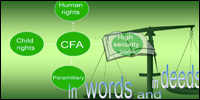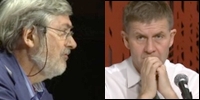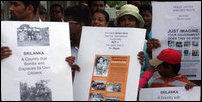|
|
180 matching reports found. Showing 1 - 20 [TamilNet, Sunday, 08 October 2017, 23:00 GMT]The World Bank (WB), the International Monetary Fund (IMF) and the World Trade Organisation (WTO) have influenced the Colombo-based unitary system to prepare ‘Vision 2025’, a policy which gives a face-lift to the ‘development paradigm’ of genocidal Sri Lanka. The drafters of SL Constitution, engineering ‘reforms’ in the unitary system, are also the agents serving the external masters. The new constitution is going to be the bed-rock for many more so-called reforms and Acts to be enacted in future to permanently lock the island as a single-unit into the bandwagonism of the West. New Delhi has already been locked in the grid as a ‘Strategic Partner’. The interim report on the constitutional discourse should be seen coupled with ‘Vision 2025’, launched in September jointly by SL President Maithripala Sirisena and Prime Minister Ranil Wickremesinghe. Full story >> [TamilNet, Thursday, 22 January 2015, 07:19 GMT]Right from the Indo-Lanka agreement of 1987 to Oslo Declaration of 2002 and to hitherto unrevealed Singapore Principles of 2013 that brought the Sampanthan polity into a conceptual framework for the recent regime change in Colombo, the external forces seeking to influence the affairs of the island have taken the Eezham Tamils for a ride to confine the Tamil polity into the unitary State of genocidal Sri Lanka without securing any concrete and descriptive guarantee from the Sinhala polity. By its latest move, the ITAK has pushed the Tamils back into the past, Tamil political observers in Jaffna said citing the so-called Singapore Principles from 2013. TamilNet brings out the text of the so-called Singapore Principles for the edification of global Tamils. Full story >> [TamilNet, Friday, 03 August 2012, 17:44 GMT]Chennai-based Indian media The Hindu, well known for the roles it played in setting opinion against the independence of Eezham Tamils, in deliberately failing to bring in awareness even when the war was turning into one of the worst genocides of modern times, and in image-building exercises for the Rajapaksa regime after the war, was trying to absolve an array of culprits from the crimes on Thursday, by finding a respected person like Gandhiyam David at the age of 88, to naively pass the blame on the LTTE. In April this year David was cited saying that he should be buried in Vanni when Tamil Eelam becomes a reality. The Hindu desecrated him on Thursday by tagging him as “Sri Lankan Gandhian”. Mr. David should have refrained from honouring a media like The Hindu by giving an interview, commented a new generation politician in the island. Full story >> [TamilNet, Thursday, 22 March 2012, 02:21 GMT] The Norwegian Minister for International Development and Environment, Mr Erik Solheim, who also handles the country’s peace facilitations in different parts of the world, has been asked to leave the government by the leadership of his Socialist Left (SV) Party in the coalition, according to media reports on Wednesday. He has been told to give way for younger talents from his party. The immediate reaction of the minister was strong disagreement with the decision of his party, but he refrained from commenting on his exit before an official announcement by his party. Mr Solheim is widely seen as Norway’s main player in the failed peace process in the island of Sri Lanka. Full story >> [TamilNet, Saturday, 07 January 2012, 13:33 GMT]“After the war, with protection of Tamil civilians neutrralized, the Eezham Tamils have become powerless even to conduct their routine day-to-day activities to survive. The occupying Sri Lankan army, the military-led administration of Colombo, and Sri Lankan ministers such as Rishad Bathiutheen, who intervene in the affairs of resettlement, have become the authorities of ‘appeal’ in resettling the Muslims in Jaffna and other places,” says a Colombo-based Tamil academic responding to an appeal that appeared Thursday in the Island paper. The appeal was made by a group of 68 Colombo-based Tamils. The academic describes the move as an attempt to create divisions among the Tamil speaking people and as a move to counter the real civil society in the North and East that has recently spoken up on course correcting the Tamil National Alliance. Full story >> [TamilNet, Saturday, 31 December 2011, 16:34 GMT] A set of documents prepared by the LTTE’s Peace Secretariat during Geneva peace talks held in February 2006, in June 2006 in Oslo and in October 2006 in Geneva, some of which have not yet reached public domain, are being released by TamilNet to facilitate a deeper understanding of the peace process and its eventual collapse. While 2011 has been a "year of reports," the UN panel report, Norway’s ‘Pawns of Peace’, the genocide model LLRC report etc., the LTTE documents provide valuable insight into the Tigers' efforts undertaken to fulfill LTTE's commitment to the International Community. Though groups such as the International Crisis Group (ICG) reject the application of the concept of "earned sovereignty" to Eezham Tamils, the documents prepared by the Peace Secretariat show how the concept was validated in practice by the LTTE. Full story >> [TamilNet, Wednesday, 16 November 2011, 10:25 GMT] The Norway report on the failed peace in Sri Lanka, concluding that Asian powers in pursuance of military solution were a reason for the failure, cautions that this model of ‘conflict resolution’ will challenge future Norwegian-style mediations. India’s role in the genocidal model of conflict resolution is not adequately discussed in the report, yet bits and pieces in the report along with what transpired in the panel discussion in Oslo on Friday, place India as decisively responsible for the ‘Asian model’ that ended the war in genocide. Meanwhile, citing the upsurge of Sinhala nationalism as a result of the international peace process, the report advises appeasement by leaving the fate of Eezham Tamils to ‘domestic solutions’. But an upsurge of Tamil nationalism resulting from the genocide, snowballing in either side of the Palk Bay, is yet to make impact with the IC. Full story >> [TamilNet, Friday, 11 November 2011, 11:11 GMT]A report on Norway’s failed peace process in Sri Lanka, “Pawns of Peace: Evaluation of Norwegian Peace Efforts in Sri Lanka, 1997-2009” was released in Oslo on Friday. Whether pawns of peace or ploys for genocide, Norway’s report distributed blame among all the actors. A deficiency the report finds in Norway was not its grave failure to warn the world about peace turning into genocide, but that Norway should have escaped from the scene at an earlier stage. The report admits that the peace process has only enhanced obstacles to peace now. But, even after the process facilitating internationally abetted genocide, the report subconsciously sees “victory” in the war and it now harps on “primacy of domestic politics,” to imply ways for solutions. Norway washes hands of its responsibilities to victims and the report now seeks lessons to learn for ’peacebuilding’ elsewhere. Full story >> [TamilNet, Saturday, 28 November 2009, 12:27 GMT]A Tamil candidature in the presidential elections, proposing a political solution deviating from the goals of Tamil nationalism, is a tactic to bind and nullify the aspirations of Eezham Tamils, writes TamilNet political commentator in Colombo. In the current circumstances, Tamils naturally boiling with anger about both the main candidates are most likely to cast their votes en masse to any respectable Tamil candidate. But it is an artful move to get a mandate by stealth from the surviving people of the North and East for dropping the fundamentals of Tamil nationalism set earlier in 1977 and for locking them with political subjugation within a single state in the island. Therefore the election proposal of any potential Tamil candidate should be the removal of the 6th Amendment to the constitution and not any half-backed formula, the commentator further said. Full story >> [TamilNet, Saturday, 19 September 2009, 13:04 GMT]Calling for the creation of independent and sovereign Tamil Eelam, based on Vaddukkoadai Resolution (VR) was the last spontaneous and definite mandate by Eezham Tamils in a totally free and democratic atmosphere. As the need for democratic political organisation unfolds afresh, Tamils have to take up the thread directly from the VR. The Thimphu principles and all the other formulas put forward subsequently under the duress of powers, and failed as negotiation models, do not get precedence over the VR as bases for political organization. Mu’l’livaaykkaal was not the real defeat. The defeat comes only when Tamils are made to politically denounce their heart-felt aspirations. The diaspora needs to peruse and correct course of any proposal that stops just at self-determination. In UN charter and in international law it is just an empty phrase that doesn’t protect nations or ethnicities. Full story >> [TamilNet, Wednesday, 22 April 2009, 17:36 GMT] South Africa's deputy minister for Communications, Radhakrishna Padayachie, has reiterated calls for bilateral talks between the Sri Lankan Government and the LTTE to establish a permanent peace. The African National Council (ANC) Member of Parliament, citing a "common conviction in the right to people for self determination" as the basis of continued relationship between his party and the LTTE, rejected suggestions that the LTTE can be defeated, and added that a political solution that addressed the "resolution of the minority question" was the only possible way forward.
Full story >> [TamilNet, Sunday, 09 November 2008, 21:58 GMT] More than two hundred Australian Tamils held a vigil in Perth, Western Australia on Friday between 11:00 a.m. to 1:00 p.m., in front of the electorate office of Minister for Foreign Affairs Stephen Smith, to create an awareness among the Australian public and inform the Australian government about the plight of the displaced people in Wanni. This is the fourth in a series of protest vigils, being organised by the Australasian Federation of Tamil Associations (AFTA). Full story >> [TamilNet, Wednesday, 02 January 2008, 16:54 GMT] "The International Community has been vacillating in taking decisive actions on Sri Lanka because they are unable to relate their own interests to the chaotically unfolding political and military situation in Sri Lanka. Only the demonstration of military strength by the Tigers can bring clarity to the situation, for the international community to correctly relate their interests, and assertively engage," said Balakumaran, a Senior Member of Liberation Tigers of Tamileelam, during a Political Analysis program, Nilavaram, in National Television of Tamileelam (NTT), this week.
Full story >> [TamilNet, Thursday, 22 February 2007, 16:54 GMT]The Liberation Tigers of Tamil Eelam, in a statement marking five years since the signing of 22 February 2002 Cease Fire Agreement (CFA) with the Government of Sri Lanka (GoSL), said the CFA formulated with the full support of the international community, had transcended the parameters of Sri Lanka’s majoritarian constitution, recognizing Tamil Eelam’s de facto existence and the balance of power between the Government of Sri Lanka (GoSL) and the LTTE. However, the international community’s insistence on a solution that does not infringe on the "territorial integrity and sovereignty of Sri Lanka," is deeply frustrating for the Tamil people, the statement said. Full story >> [TamilNet, Sunday, 29 October 2006, 16:57 GMT] The talks in Geneva ended Sunday without any agreement between the Parties, the Government of Sri Lanka and the Liberation Tigers of Tamil Eelam on the Humanitarian crisis and the re-opening of closed gateways. Responding on Democracy the Tigers said they were "more committed to the democratic principles" than the GoSL and challenged the GoSL to repeal the sixth amendment to the SL constitution as a token of its commitment to democracy and pluralism. The LTTE also challenged the GoSL to remove its armed forces from the Tamil homeland and allow the holding of a referendum under international supervision to ascertain the aspirations of the people in the homeland. Full story >> [TamilNet, Saturday, 28 October 2006, 10:49 GMT] The Liberation Tigers called Saturday for the full implementation of the February 2002 ceasefire agreement (CFA), saying "such actions will bring normalcy in the lives of our people, and help in taking forward the peace process towards a satisfactory conclusion." Addressing the opening session of the Norwegian facilitated negotiations in Geneva, LTTE's Political Head, Mr. S. P. Thamilchelvan, said: "the best we can hope for from the current talks is therefore, the strengthening of the CFA agreement that has the potential to lead to a permanent, just peace in this island." Full story >> [TamilNet, Friday, 09 June 2006, 15:24 GMT] The Liberation Tigers of Tamil Eelam issued a Communiqué on Friday after concluding meetings begun two days ago with Sri Lanka Monitoring Mission (SLMM) and the Norwegian facilitators in Oslo.
Full story >> [TamilNet, Monday, 22 May 2006, 13:48 GMT]Pointing out that the "primary cause of the current violence has been due to the refusal of the Sri Lankan State to implement key provisions of the CFA that obligates the State to disarm and dismantle Paramilitary armed groups in the Northeast of Sri Lanka," the Tamil National Alliance in a press release issued Monday, urged "that no action be taken which casts the blame on one side," cautioning that "such a step can irretrievably harm the legitimate interests of the long-suffering Tamil people," and appealed to the European Union and the International Community for a "more even-handed approach."
Full story >> [TamilNet, Saturday, 25 February 2006, 21:39 GMT] LTTE's Chief Negotiator and Political Strategist, Anton Balasingham, in an exclusive interview with Sunday Leader, said that although the talks were difficult and tough, the Sri Lanka Government has "accepted the meaning and content of this document [Cease Fire Agreement]," and on the issue of paramilitaries he said: "we have told the government, you better start disarming these groups and put an end to their armed military operations so that we could send our cadres to the north and east.We are ready to do that.And if anything happens to them, it will constitue a very very serious violation of the joint statement issued by both the parties." Full story >> [TamilNet, Saturday, 26 November 2005, 01:33 GMT] The definition "supreme authority within a territory," captures the essential notion of sovereignty used to describe political authority of modern nation states. The origins of Sri Lanka’s long festering conflict lie in its unitary constitution which vests the exercise of sovereignty solely in the hands of Sinhala Buddhists. But Colombo wields no sovereign authority over nearly seventy percent of the island’s NorthEast. Radical Sinhala groups view the denial of their state’s sovereignty in areas controlled by the Liberation Tigers with extreme chagrin. Over the years, other events too have challenged Sri Lanka’s sovereignty. Full story >>
|
|

















